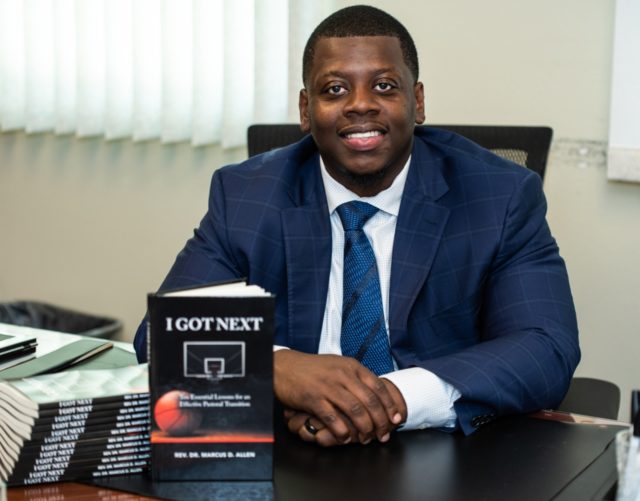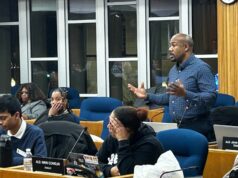As far I can remember, Sunday mornings have always been dedicated to gathering in a church to praise and worship God. In 1988 my mother joined the Great Migration and relocated from Clarksdale, Mississippi to Milwaukee, Wisconsin. This was a difficult move because we did not have any family, friends or connections in Milwaukee. She was just chasing a dream for a better life for her family. I remember the tough times of having to live in a shelter and standing in food pantry lines to ensure we had food to eat. I remember the poor housing conditions we endured and the poverty we faced. I am also thankful because I am reminded that in every poor condition we faced, it was a church there to help alleviate some of the pain with which we were struggling.
It was in the church where we were able to create community and gain a family. The impact my childhood church Mt. Pilgrim Missionary Baptist in Milwaukee had on my life is incredible. I saw the positive effects the Sunday sermons and worship had on my mom each week. The joy and celebration during a Black worship service are unmatched. Our worship services are full of laughter, dancing, clapping, screaming, shouting and some Sundays we may even have someone who would run around the church. This level of worship is so intense and enthusiastic because of the bitterness and strife Black people continue to endure in this country. We worship so passionately because we understand what our ancestors suffered just for us to call something to call our own.
The Black church was formed by the slave masters allowing the black minister to preach to the slaves. It was in 1619 in Jamestown, Virginia, where the first ship docked releasing stolen Africans to become slaves in America. Some would say that Christianity is the White man’s religion or we are serving a slave religion. I disagree with this. In the book of Acts, chapter eight, we read a narrative of an Apostle of Jesus named Philip who baptizes an Ethiopian eunuch who works for the Queen and converts him to be a follower of Christ. I am confident that Christianity was in Northern Africa before ever reaching Europe. I also believe that many Africans were followers of Christ before being stolen from their homeland.
It is remarkable to think that people can worship and serve a sovereign God while suffering the brutality of slavery: the daily hard labor, the beatings, the degrading, the separation of families and the raping of Black women just to name a few. But these believers held on to their faith and their trust in God.
Often, the slaves would worship with the slave master but would be restricted in the way they praised God. Therefore, they held secret worship services in “hush harbors,” to worship freely. These “hush harbors,” were woods, gullies, ravines, thickets and swamps that consisted of heartfelt worship which stressed deliverance from the toil and troubles of the present world, and salvation in the heavenly life to come.
During slavery, the education of the enslaved was highly discouraged and made illegal in most southern states. The most oppressive limits on slave education were a reaction to Nat Turner’s revolt in Southampton County, Virginia, during the summer of 1831. This revolt had a particularly far-reaching impact on education for generations of black people. The goal was for the slave owners to keep the enslaved illiterate which in turn will keep them oppressed.
During this time the Bible was used as a tool of oppression to keep Black people enslaved because the slave owners would only teach Ephesians 6:5 that states, “slaves obey your masters,” but when slaves learned to read and the Black preacher learned to explain the Bible, they explored Exodus 5:1 which shouted, “let my people go!” It was the ability to read that gave many the courage to run and attempt to gain liberation. Thank God for pastors who gained the ability to read and write.
W.E.B. Du Bois immortalized Black pastors in his famous essay, “Of the Faith of the Fathers,” that appeared in his seminal work, The Souls of Black Folk. Du Bois described the preacher as “the most unique personality developed by the Negro on American soil,” a man who “found his function as the healer of the sick, the interpreter of the Unknown, the comforter of the sorrowing, the supernatural avenger of wrong, and the one who rudely but picturesquely expressed the longing, disappointment, and resentment of a stolen and oppressed people.”
The Black church has played a pivotal role in ensuring the liberation of Black people. It saddens me that so many Black young adults disregard or fail to acknowledge the impact the Black church has had on our community. I understand that over time that some Black churches have moved from liberation and justice but have focused more on prosperity. However, even if you are not a Christian believer you cannot forsake the work of the Black church.
- It was in the Black church where our people learned how to read, write, do math, community, teamwork, etc.
- It was the Black preachers who preached that slavery was wrong and this nation would suffer divine punishment. Frederick Douglass was a Methodist minister and abolitionist who was not afraid to condemn America for having slaves.
- Last year I watched a PBS series called “The Black Church,” and it was said that during Reconstruction it was a group of black ministers who demanded forty acres and a mule. (still have not received)
- In 1856 the African Methodist Episcopal Church created the first Historical Black College, Wilberforce University.
- In 1888 it is the black church that helped start the first Black bank, “Capital Savings Bank.” African-American churches and fraternal organizations served as pooling places for the capital needed to open a bank that was sensitive to the needs of the African-American community.
- It was the Black churches that played an enormous role in the civil rights movement. They allowed people to congregate to conduct business at the church. Throughout history, the black church has served not only as a place to worship, but also as a community support group, bulletin board, the place to solve disputes, and a center of political activism.
- Many of the leaders of the civil rights movement were black pastors and preachers.
The Black church is needed more today than it was many years ago. God has allowed me to serve Mt. Zion Baptist Church in Madison, which is the oldest and largest predominantly Black church in Madison. Our church continues in the tradition of the Black church being the Hub of Hope for the community. In our country today, Black people continue to endure disparities, oppression and rejection. Mt. Zion continues to be a place where people can come and find hope in the songs we sing, joy in the fellowship of gathering with others and hope in the sermons that are preached.
Not only is Mt. Zion focused on enhancing the spiritual well-being of all who visit our church, but we also focus on “Lifting Our Community.”
We recognize the need for early literacy training, improved high school graduation rates, reduction in youth experiences with the justice system, better health outcomes for seniors, mental health issues, and access to technology and food securities. We will provide space for teaching opportunities, resources, coaching and accessibility to all these issues.
Finally, I am excited about the direction of the Black church. We are evolving with the times to meet the needs of this present age. I am proud to say that over the last two years, Mt. Zion has had an influx of white people joining our congregation. This proves that even though the Black church was created to cause separation through race, God is removing racial lines and we all can worship together.
I am who I am because of the Black church. It’s where I learned teamwork, communication skills, leadership, how to follow directions and how to celebrate other’s success. The Black church made me. My pastor Rev. George H. Jolly saw something in me when I was only a teenager. On July 1997, when I was only 14 years old, he licensed me to preach the gospel of Jesus Christ. But most importantly he started to call me son. My father never wanted anything to do with me, but my Black pastor took me in and treated me just like his son. It’s these experiences in the Black church that has created so many of our leaders today. Thank God for the Black church.


































